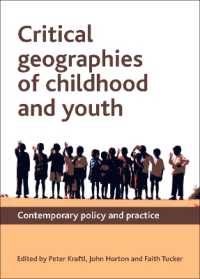- ホーム
- > 洋書
- > 英文書
- > Politics / International Relations
Full Description
Combining extensive commentary by the authors and excerpts from original scholarship, International Relations Theory evaluates all the major theoretical perspectives that political scientists use to analyze world politics.This unique survey/reader not only looks at classic international relations theory but takes into account changes in the world and important developments in the field. Highly regarded for its lucid and comprehensive coverage, International Relations Theory explains the role of theory in studying world politics and invites readers to critically engage the field's many controversies.
Contents
*Readings new to the fifth edition.Chapter 1. Thinking About IR TheoryThe IR Field in An Age of GlobalizationEpistemology, Methodology, and OntologyWhat is Theory?ImagesInterpretive UnderstandingsNormative TheoryA Look AheadSelected ReadingsJames Rosenau, "Thinking Theory Thoroughly"*Thomas C. Walker, "The Perils of Paradigm Mentalities: Revisiting Kuhn, Lakatos, and Popper"Chapter 2. Realism: The State and Balance of PowerMajor Actors and AssumptionsIntellectual Precursors and InfluencesPowerSystemChangePower TransitionLong Cycles Globalization and InterdependenceRealists and Their CriticsSelected ReadingsThucydides, "The Melian Dialogue"Niccolo Machiavelli, "On Princes and the Security of Their States"Thomas Hobbes, "Of the Natural Condition of Mankind"Jean-Jacques Rousseau, "The State of War: Confederation as Means to Peace in Europe"Kenneth N. Waltz, "Explaining War: The Levels of Analysis"Joseph S. Nye, Jr., "Hard and Soft Power in American Foreign Policy"Suggestions for Further ReadingChapter 3. Liberalism: Interdependence and Global GovernanceMajor Actors and AssumptionsIntellectual Precursors and InfluencesIntegrationTransnationalismInterdependenceInternational RegimesNeoliberal InstitutionalismGlobal GovernanceEconomic Interdependence and PeaceThe Democratic PeaceDecision MakingChange and GlobalizationLiberals and Their CriticsSelected ReadingsStephen G. Brooks, "Producing Security"*Robert O. Keohane, "Beyond the Tragedy of the Commons"Suggestions for Further ReadingChapter 4. Economic Structuralism: Global Capitalism and PostcolonialismMajor Actors and AssumptionsIntellectual Precursors and InfluencesDependency TheoristsThe Capitalist World-SystemChange and GlobalizationPostcolonialismEconomic Structuralists and Their CriticsSelected ReadingsJ.A. Hobson, "The Economic Taproot of Imperialism"*Barbara Bush, "Culture and Imperialism"Immanuel Wallerstein, "The Modern World System as a Capitalist World Economy"Suggestions for Further ReadingChapter 5. The English School: International Society and Grotian RationalismMajor Actors and AssumptionsIntellectual Precursors and InfluencesThe Divergence of British and American ScholarshipThe Genesis of the English SchoolLevels of Analysis and TheoryChangeThe English School, Liberals, and Social ConstructivistsThe English School and Its CriticsSelected ReadingsHugo Grotius, "The Law of Nations on War, Peace, and Freedom of the Seas"Tim Dunne, "Inventing International Society"Hedley Bull, "Does Order Exist in World Politics?"Suggestions for Further ReadingPART II. INTERPRETIVE UNDERSTANDINGSChapter 6. Positivism, Critical Theory, and Postmodern UnderstandingsPositivismIntellectual Precursors: Phenomenology and HermeneuticsCritical Theory: Major AssumptionsPostmodernism: Major AssumptionsCritical Theorists, Postmodernists, and Their CriticsSummationSelectedKen Booth, "Critical Explorations and the Highway of Critical Security Theory"David Campbell, "Writing Security"Suggestions for Further ReadingChapter 7. Constructivist UnderstandingsMajor Actors and AssumptionsIntellectual Precursors and InfluencesIntersubjectivityStructure, Rules, and NormsAgentsIdentity Logic of AppropriatenessInterestsThe Diversity of Social Constructivist ThoughtWendt's "Naturalist Constructivism"Constructivist Affinities in the Broader IR FieldConstructivists and Their CriticsSelected ReadingsAlexander Wendt, "Constructing International Politics"Martha Finnemore, "Constructing Norms of Humanitarian Intervention"Suggestions for Further ReadingChapter 8. Feminist Understandings in IR TheoryIntellectual Precursors and InfluencesMajor AssumptionsStrands of Feminism in IRGender, War, and Security StudiesGender and International OrganizationsGendered Understandings and IR TheoryFeminists and Their CriticsSelected ReadingsIris Marion Young, "The Logic of Masculinist Protection: Reflections on the Current Security State"J. Ann Tickner, "Why Women Can't Rule the World: International Politics According to Francis Fukuyama"Suggestions for Further Reading








